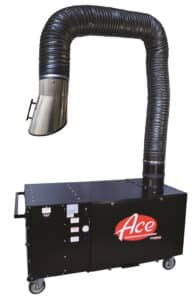73-601 Mobile Fume Extractor
Description
A heavy duty mobile fume extractor ideally suited to high volume production TIG, MIG, and stick welding. This extractor features a 10 foot fully articulating arm, and is equipped with your choice of a 95% (MERV 15) main filter for use on carbon steel and a HEPA main filter for stainless steel.
- 1200 cfm, high volume fume extraction and filtration capacity
- Designed for full time production welding with the mobility to move from workstation to workstation
- 10 foot extraction arm with articulated joints designed to hold position for hands-free use
- Units accommodates 18 different filtering combinations for maximum flexibility in all types of applications
- 73-601-HEPA: HEPA (99.97% @ .3 microns) efficiency main filter and high capacity pre filter
- 73-601-95: 95% (MERV 15) efficiency main filter and high capacity pre filter
- Wide mouth source capture hood
- Built in spark trap for fire safety
- Heavy duty steel construction
- Durable casters, two that swivel and lock for stability
- Analog filter status gauge
- CSA listed for US and Canada
- Two year limited warranty
- Made in USA of US and imported parts
- 1 HP, 11.6 Amp, 115 VAC, 60 HZ, Single Phase
- Direct drive motor blower system
- 10 Foot AC cord with grounded plug
- Sound: 69 dB @ 5 feet
- Dimensions: 52″L x 29″H x 26″W
- Weight: 315 lbs.
NOT RECOMMENDED FOR PLASMA CUTTING OR CARBON ARC GOUGING
Click To Enlarge Image
Additional Information
Click To Read
Frequently Asked Questions
There are currently no “blanket” regulations prohibiting the placement of used filters into standard trash receptacles. Local authorities, however, may place certain restrictions on this […]
Yes you can. Local authorities, however, may place certain restrictions on this practice, so we advise checking with applicable agencies to ensure conformance with the […]
Welding fume extraction hoods should be placed close enough to the welding arc to be effective, yet not so close as to distrub shielding gases […]
Used filters can be easily removed from Ace extractors. We recommend the operator wearing gloves and protective eyewear, placing the removed filters into a trashbag, […]
There are several factors that determine the best extractor to use, including location, usage, materials, and quantity of smoke/fume produced. In general, however, the rule […]
Ace makes a wide variety of filters available that work in combination to provide the best possible filtration for your work application. Generally speaking, 95% […]
There is no clear answer to this question as too many factors can influence the life of filters, including, but not limited to, welding process, […]
Yes, the Ace stationary system is designed to accommodate such a change in regulations, so you can purchase and install Ace wall mounted arms and […]
Filters are rated on their efficiency to stop and trap particulate of a particular size. Most filters used in Ace extractors base their efficiency rating […]
Ambient air cleaners are effective supplements to fume extractors, but should be avoided as a primary tool for fume control. Because of the nature of […]
The practice of using fans and blowers in this manner is called the dilution method, and while it is commonly used, this method may not […]
The short answer is that a respirator protects the welder wearing it, but does nothing for nearby workers not wearing similar protection. The somewhat longer […]

